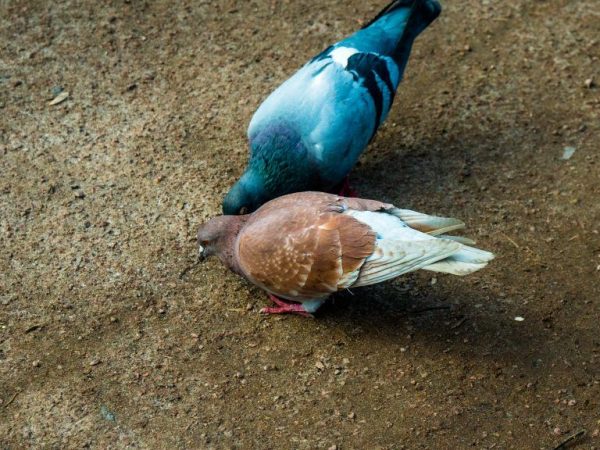Newcastle disease in pigeons
Newcastle disease in pigeons, or whirligig, is a popular pathology among birds. It is a severe viral disease that is transmitted through the air. More than 2,000 birds die from it every year. The disease manifested itself in the twentieth century and came to us from the island of Java.

Newcastle disease in pigeons
Features of the
The infection kills the nervous system. The incubation period is one day, after which the bird begins to spread the disease. Signs of infection appear only after 3-4 days. The disease immediately affects all organs, they simultaneously begin to bleed (liver, heart, spleen).
The virus is transmitted from bird to bird when they come into contact with each other. Most often, contamination occurs through dirty and contaminated water, food and through the air. The wind "helps" the disease to spread over a long distance. The peak of the disease occurs in autumn and spring. Usually birds die from a lack of water in the body already on the 8-11th day.
Newcastle disease in pigeons is very difficult. People are not afraid of this ailment: at most, it will cause upset and discomfort in the stomach. But people also transmit this disease through touch, so you need to wash your hands more often and maintain general hygiene. The virus is very persistent, it can live in a carcass for six months, even if it is frozen.
Stages of the disease
There are 3 stages of pathology, each of which has its own symptoms.
- First stage. The pigeons walk strangely, as if they are not sure of their steps. The hunger remains, and the bird is still drinking water. Feathers stand on end, thin out; the eyes turn red, and the beak is covered with strange spots. The bird weakens and shows aggression.
- Second stage. Twitching, droppings turn green. It is at this stage that the pigeon refuses food and water.
- Third stage. The bird begins to turn its head, it is because of this that the second name of the disease is "whirligig". The individual's neck is bent, and inflammation of the brain is also diagnosed.
There are times when Newcastle disease in pigeons develops into a chronic stage, then the pigeon lives for more than a month. In such a situation, it makes no sense to treat the bird, because the infection has already grown in the body.
How to treat
If you manage to carry out the treatment in time, the pigeons have a chance of recovery. Fosperil is often used for treatment. The medicine should be given within 20-23 days. The drug perfectly helps to increase immunity, improves metabolism. The medicine can be soldered through the beak or injected into the pectoral muscle. There are no side effects.
Also, for the treatment of the disease, you can use "Piracetam", it must be given 4 times a day. It has a good effect on the nervous system, strengthens it and also improves blood circulation in the vessels. The medicine can be diluted in water and poured with a syringe through the bird's beak, you can also hide the capsule in bread. Vitamins can be used to avoid illness.
Many experts recommend injecting one dose of Catosal every day into the pectoral muscle. It can also be taken as a vitamin, preferably within 2 weeks. The vitamin can be dripped into water.
Folk methods of struggle
There is a traditional method that effectively fights infection. For this you will need:
- garlic;
- milk;
- wheat grain;
- crushed barley.
All ingredients must be mixed and given to the pigeon. The medicine can be given with a syringe through the beak for 2 days. Veterinarians also recommend adding belladonna.
Prophylaxis
So that the dovecote never gets infected, you need to adhere to special rules. First you need to observe the behavior of the pack. Good care and nutrition is the main rule of prevention. Before the exacerbation of the season, it is advisable to give the pigeons vitamins for at least 2 weeks. And, of course, the main thing is not to forget about vitamin B, which can be found in:
- fresh grass;
- oatmeal.
A balanced diet, constant access to vitamins and microelements is the guarantor of good health for birds.
The drug for treatment and prevention should be prescribed only by a veterinarian after examining the entire flock. Young animals do not tolerate this procedure well, become immobile, lose their appetite and do not drink water.
Breeder Tips
It is best to isolate the infected individual from others, and then give them vitamins to raise immunity. Also in the room it is necessary to carry out a general cleaning and throw away the used inventory. Each time after contact with a flock, the farmer should thoroughly wash his hands with soap and water.
When the disease progresses, the young should be fed with baby cereals without milk, pouring liquid into the beak. A flock can be treated only after consultation with specialists and according to their recommendations. Also, do not forget about prevention.
The infection poses no danger to humans, but can be transmitted to domestic chickens. It is important to carry out prevention on time, then there will be no problems.


